
Don’t let government scapegoat migrants for the housing crisis
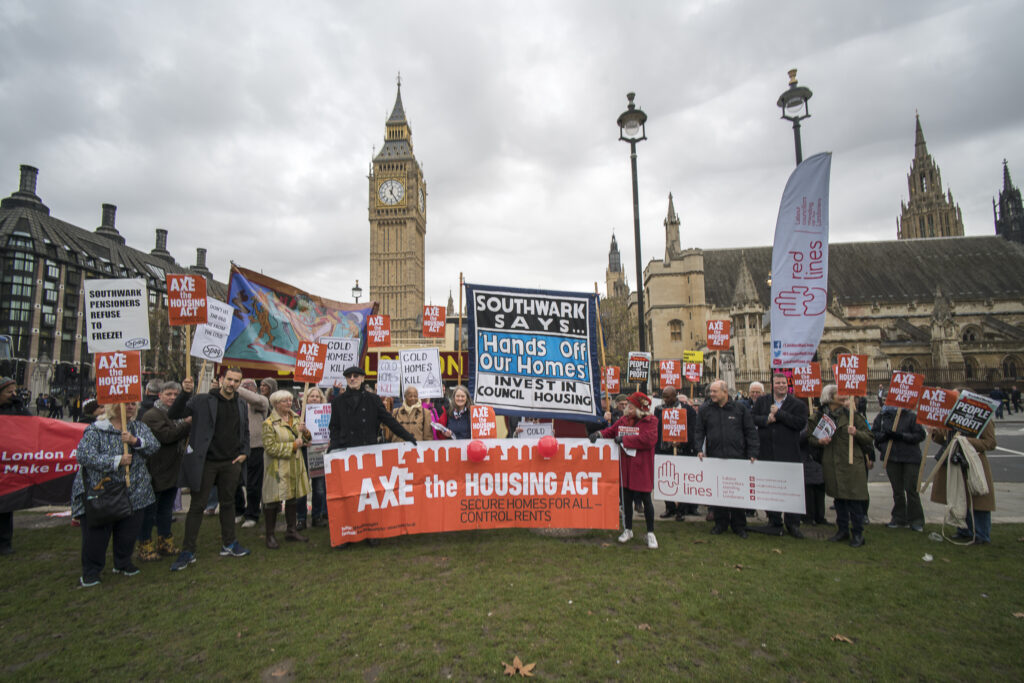
And here we are again!
Another in a long line of attempts by the government to distract attention from its failure to solve the housing crisis by attempting to blame others. In 2016 the Housing Act identified better-off council tenants as the problem and the governments solution was to be ‘Pay to Stay’, which was defeated by a combination of local authorities saying it would be unworkable, and thousands of tenants and residents in the campaign we initiated.
This time the government returns to a familiar refrain – ‘Don’t blame us for the lack of council housing, blame migrants!’ The Consultation on reforms to social housing allocations, published 30 January 2024 has been dubbed ‘British homes for British workers’. Yet it contains no plans to increase the overall supply of council housing, only to restrict access further.
Homes for All and Defend Council Housing have initiated a statement in response. Many of our concerns are shared by charities and organisations in the sector. Fourteen housing bodies signed a letter opposing ‘British homes for British workers’ policy. The letter highlighted that 90% of new social housing lettings go to UK nationals.
Please sign the statement (set out below)
This leaflet is available in hard copy. Contact us if you would like some to distribute.
Government not Migrants caused the housing crisis
It’s time to invest in council housing
The British homes for British workers agenda is racist and divisive. The proposed exclusions of people from applying for social housing, and the ill-considered and draconian new eviction provisions, both meet with our determined opposition. Neither of them will do anything for those people who have been systematically shut out of the housing market by the effects of past government policies.
Instead, we should celebrate the diverse communities on housing estates and in housing need. We call upon the government to increase the numbers of social homes by enacting the Five Point Plan endorsed by the campaigning organisations Homes for All and Defend Council Housing.
- Government investment in a mass council housing building programme, including requisitioning of empty homes and abolition of ‘right to buy’
- Rent controls and secure tenancies in the private rental sector. Robust regulation of housing associations
- New funding to repair and refurbish existing council housing – do not demolish
- Adequate funding for accessibility, fire safety, and for retrofitting and thermal insulation
- Planning for the people and the planet, and not for developers’ profits
The government misunderstands the purpose of housing policy
The government misunderstands the purpose of housing policy, which is to ensure that every household has a decent, secure, affordable home. Housing policy does not exist for the government to propagate a narrow and exclusive version of patriotism, or to devise double jeopardy schemes for those who have committed offences or engaged in behaviour that the government does not like, or to chuck people out of their homes. Housing policy does not exist to run deliberately divisive election campaigns. But all of that is happening here.
The housing crisis – for some
The housing problem is one of unequal distribution. The 2021 census reported that there were 24,782,800 households in England and Wales. There were 26,394,777 dwellings, so the number of homes exceeded the number of households by 1,611,977.
Action on Empty Homes report that numbers of long-term empty homes rose yet again in 2023 by 12,556 (or 5%) to 261,189, while long-term empties are now at their highest level since 2011 (excepting the special pandemic conditions of 2020).
The Consultation document repeatedly refers to the £11.5bn Affordable Homes programme. However, this provides very little new social rent housing. 40% of the 2022/23 output consists of ‘unaffordable affordable housing’ which is not open to those households in the highest need. Another 45% is Affordable Rent, and the Shelter report ‘A Capital in Crisis’ (2020) showed that London Affordable Rent (the variant of affordable rent most used in the capital) is not actually affordable for lower income working families. That leaves only 15% for new social rent homes, many of which are in fact funded to support demolitions.
Government policy is directly responsible for the scarcity of social rent housing, which the current policy initiatives purport to address.
Council housing pays for itself
The Five Point Plan requires government investment. The Shelter report ‘Building for our future: A vision for social housing’ has shown in much detail how investment in council housing pays for itself in reduced benefit costs, while enhancing social inclusion and averting the unnecessary costs of social disadvantage. This is true investment, bringing back a return greater than the initial outlay.
There are some easy wins
Some proposals in the Five Point Plan are easy wins. The Right to Buy has reduced the social housing stock and has caused the scarcity to which this consultation refers. It should be abolished, to preserve the social housing stock which we have now.
The government should revise and amend the National Planning Policy Framework (December 2023 version) paragraph 65 and footnote 31 which does NOT require replacement of the affordable housing floorspace demolished in redevelopment and regeneration schemes. There should be a full and tenure specific replacement of such homes in such circumstances, along with full compliance with affordable housing policies for the additional homes built.
Retain the space for local policy initiatives
These government proposals remove the local initiative and responsibility for many aspects of allocations. Many local authorities have retained a social awareness and a social conscience in declining to enact the exclusionary policies which have been permitted by the government on an optional basis in the past.
No to UK residence and local connection tests
Well over 80% of Britain’s housing is allocated solely by market mechanisms, creating and reinforcing inequalities which reveal the diversity of applicants and residents in social and affordable housing. The government should accept diversity and stop scaremongering about it. UK residence tests are unnecessary and show that the government does not want to assist those in the highest need – and is not concerned about equalities.
Local connection tests are discriminatory towards those who are homeless, but who have a limited connection to any specific area because of their homelessness. Mandatory tests would make that problem much worse, affecting the already socially excluded groups who are protected under the Equality Act, 2000.
No to mandatory income tests
The proposal for mandatory income tests ignores the strength that comes from mixed income communities in council housing and other social housing tenures. Nobody gains from making social housing a tenure exclusively for the poor.
In response to consultation question 22, consulting on minimum income thresholds for applicants ‘to incentivise being in work or to ensure that the household can afford the property’, we say that too many providers are already using affordability tests to keep the most economically vulnerable households out of social housing. These barriers to access are a leading cause of homelessness, and they operate in a structurally racist manner. See more detail in two detailed reports that show how Housing Associations refuse to house the poorest. The government should ensure that poor families have enough income to afford the rent and service charges on a suitable social rent property. Landlord Affordability Tests for such properties should be made illegal.
Anti social behaviour tests and eviction plans
Anti social behaviour already provides grounds for possession claims. There are anti social behaviour orders, introductory tenancies, starter tenancies and demoted tenancies. Research for the Home Office (The drivers of perceptions of anti-social behaviour) shows that nuisance behaviour is closely linked with social exclusion, which can be ameliorated by initiatives to improve the physical environment and to foster community cohesion. Instead of promoting exclusionary policies, the government should fund and develop mediation schemes to build the capacity of residents to resolve disputes, along with work, education, training, and cultural activities for alienated youth.
The government’s eviction plans make no reference to where people are going to live afterwards. But this is the question we need to be asking.
The crude and draconian requirement for social landlords to evict people gives the lie to the claim that the objective here is to house more ‘British’ people.
Proposed exclusions related to the Terrorism Act
The government is seeking to scaremonger people, using double jeopardy policies again. The definition of terrorism is questionable, owing more to selective foreign policy objectives than to housing policy. We therefore oppose the planned exclusions of applicants related to the Terrorism Act.
Conclusion
We note that the government has failed to secure the support of those who primarily own and manage social housing, and of those concerned with housing needs and homelessness, and immigrant and refugee welfare.
The National Housing Federation, Local Government Association, Association of Retained Council Housing, National Federation of ALMOs, PlaceShapers, Shelter, Crisis, St Mungo’s, Generation Rent, the No Accommodation Network, the Joint Council for the Welfare of Immigrants, the Welsh Refugee Council, and Tai Pawb have all signed a letter of opposition.
These proposals should be rejected, and replaced by investment in homes and communities instead.
“Our housing system is causing a national health emergency”
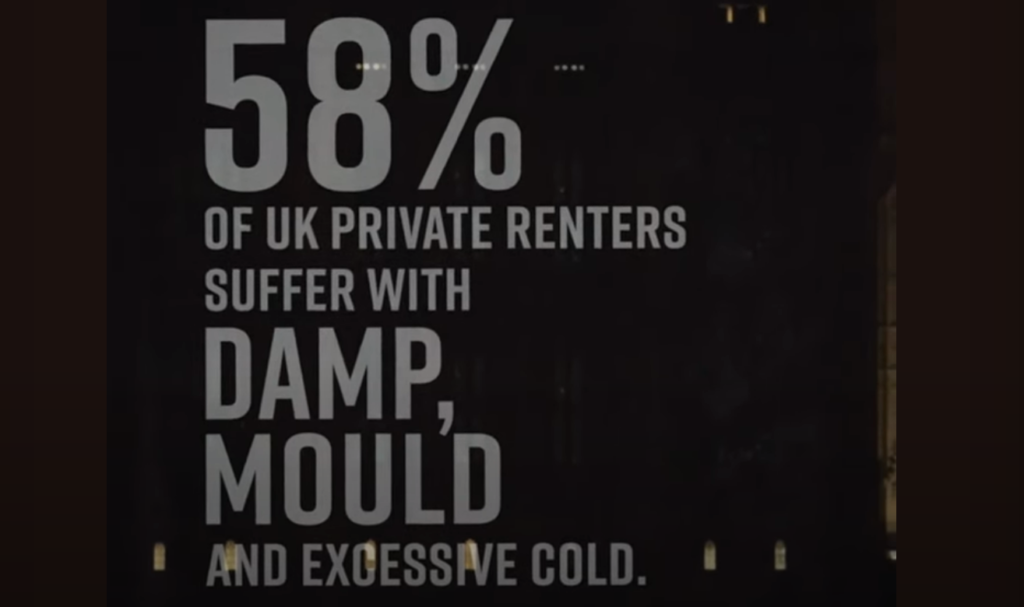
These are the words of Amaran, a children’s doctor working in South Yorkshire. He is featured in the film ‘Mould is Political’ which was projected on Wednesday last week on the Houses of Parliament. Homes for All joined the protest alongside around 80 other campaigners.
See a clip of the film and the protest outside parliament here (2 mins)
See the whole film here (12 mins) which includes a protest in Manchester also supported by H4A.
Mould is political! Action Wednesday 13 March

Register now for the action and film screening.
Wednesday 13 March, 6:30pm – 8:30pm
Homes for All be joining NEF, Homes For Us, Medact, Inclusion London and many more, to show the government that our homes must be safe.
Register here: Mould Is Political – Action and Film Screening (actionnetwork.org)
Protest on budget day called for an end to the scandal of cold homes
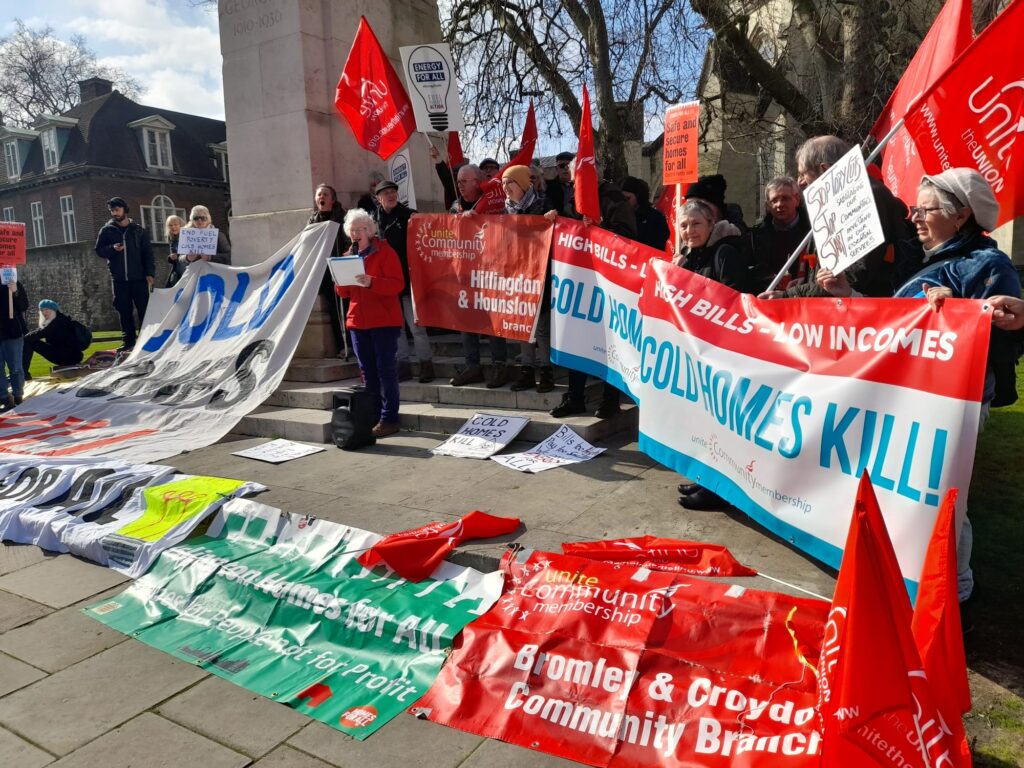
Up to 100 people joined Fuel Poverty Action on 6 March. Homes for All and activists from Unite Community, the National Pensioners Convention (NPC), Greenpeace and many more turned up outside Parliament for the Unite 4 Energy For All protest to highlight the number of people suffering due to cold and damp homes.
The Spring Budget will continue government’s policies which actively contributed to hundreds of thousands of avoidable deaths.
Speakers called for radical change in the interests of working class people and an end to the drive for profits and protecting private companies.
Please sign the online 5 point plan for council housing – this petition calls for a radical housing policy: https://forms.gle/Tf6QHtVW7iFV6RsW7
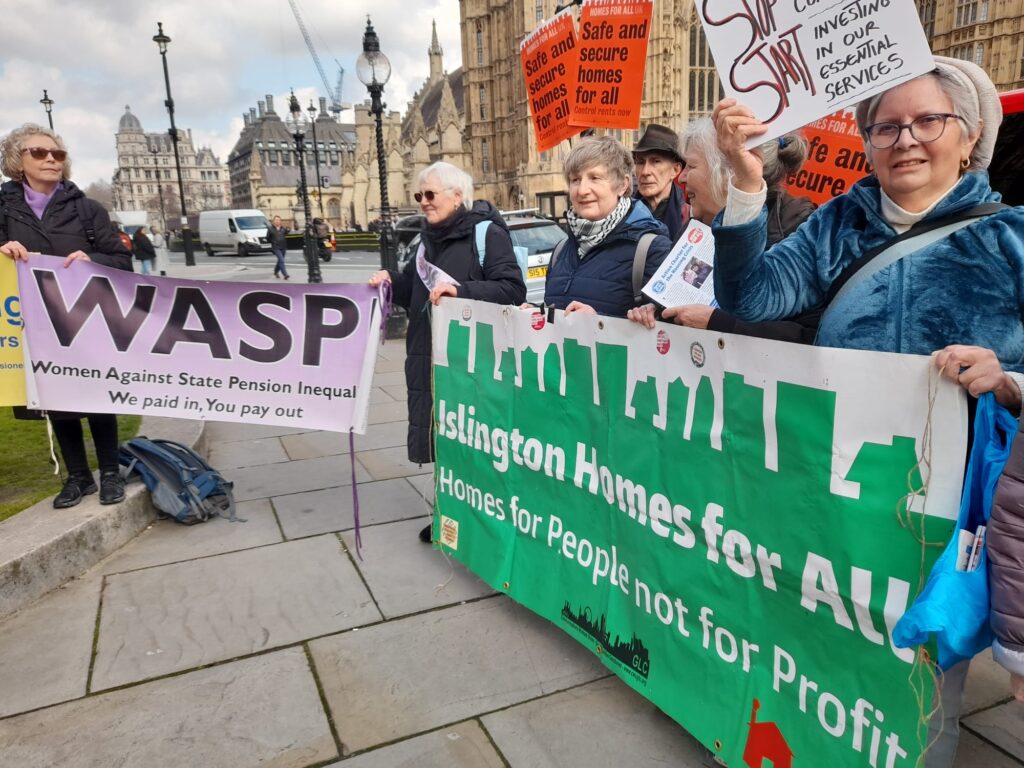
Join Fuel Poverty Action on Budget Day to stop cold weather deaths

Homes for All is supporting this London protest on the day that the government will set out its plans for the economy.
Throughout austerity, the COVID-19 pandemic and the ‘cost of living’ crisis, government’s policies have actively contributed to hundreds of thousands of avoidable deaths. Join us to demand an end to deaths fuelled by poverty.
We will protest in London alongside Fuel Poverty Action, UNITE the union, National Pensioners Convention and others. We urge our supporters in other parts of the country to join other protests planned in:
Barnsley
Birmingham
Carlisle
Exeter
Glasgow
Leeds
Manchester
Norwich
Portsmouth
Sheffield
Contact e4a@fuelpovertyaction.org.uk to find an event near you.
Housing campaigners urge Labour Councillors to adopt the 5 Point Plan
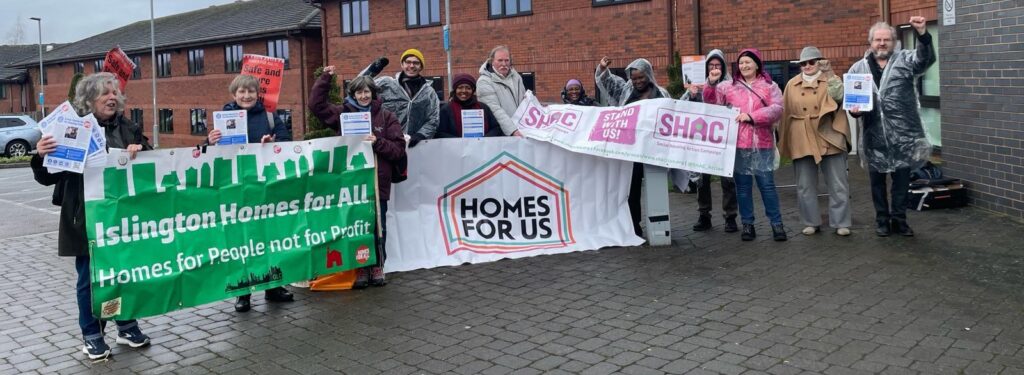
Housing campaigners traveled to Coventry on Saturday 10 February to leaflet and lobby the Labour Party local government conference and to encourage Councillors to support the 5 Point Plan for council housing. The broad-based action was supported by SHAC, Homes for Us (NEF) and others.
Whilst we were met with a generally positive response to the campaign with Councillors wanting to see housing prioritised for their constituents – concerns were raised around the Labour leadership’s failure to announce any strategy to tackle the housing crisis.
What is clear though, is that campaigners are committed to building from this action and ensuring that housing is pushed up the political agenda in the forthcoming general election. We know that the past 14 years has resulted in an acute housing crisis which is unsustainable and requires a radical change in housing policy. We need to keep on building a united housing movement and fight for decent, safe and secure housing for all.
Lobby the Labour Party LG Conference – We want homes for all and council housing

The housing crisis is out of control. As the General Election approaches, campaigners are coming together to demand radical changes in housing policy. Some of the campaigns will involve calling on the Labour Party to break from 12 years of the government’s failed housing policies and offer a radical change.
Homes for All has called for a lobby of the Labour Party’s Local Government Conference in Coventry at Warwick University on Saturday 10 February 2024. It is supported by groups within Homes for All such as DCH, SHAC, Unite Community and others, and also by The New Economic Foundation (Homes for Us) who are funding the travel from London to Coventry and back.
To book a seat on the transport contact rebecca.winson@neweconomics.org and / or eileenshort@hotmail.com
We have an organising meeting on 2 February for people who are booked to come – see this page for details http://www.axethehousingact.org.uk/get-involved/
APPG inquiry gathers momentum as more feedback meetings planned

In the latest feedback sessions local residents and councillors met in Southwark and Lancaster.
The Lancaster meeting highlighted more demolition and sell off threats to a local estate.
We have since learned of a decision to demolish six blocks in Leeds, and emergency evacuation of a Bristol estate block.
Further Inquiry sessions are planned, including the Association of Retained Council Housing (ARCH) and also in Manchester, Luton, Reading and Bristol .
The deadline for responses has been extended. There is still time to organise a feedback session in your area.
The deadline for email and written submissions is 5th January 2024. You can respond in as much detail as you like.
By email to matt.western.mp@parliament.uk or by post to Council Housing Inquiry c/o DCH PO Box 33519 London E2 9WW More details here: https://mattwestern.org/news-article/appg-for-council-housing-inquiry/
Islington Homes for All Action and Sleep-Out outside the Ministry of Justice 20 October
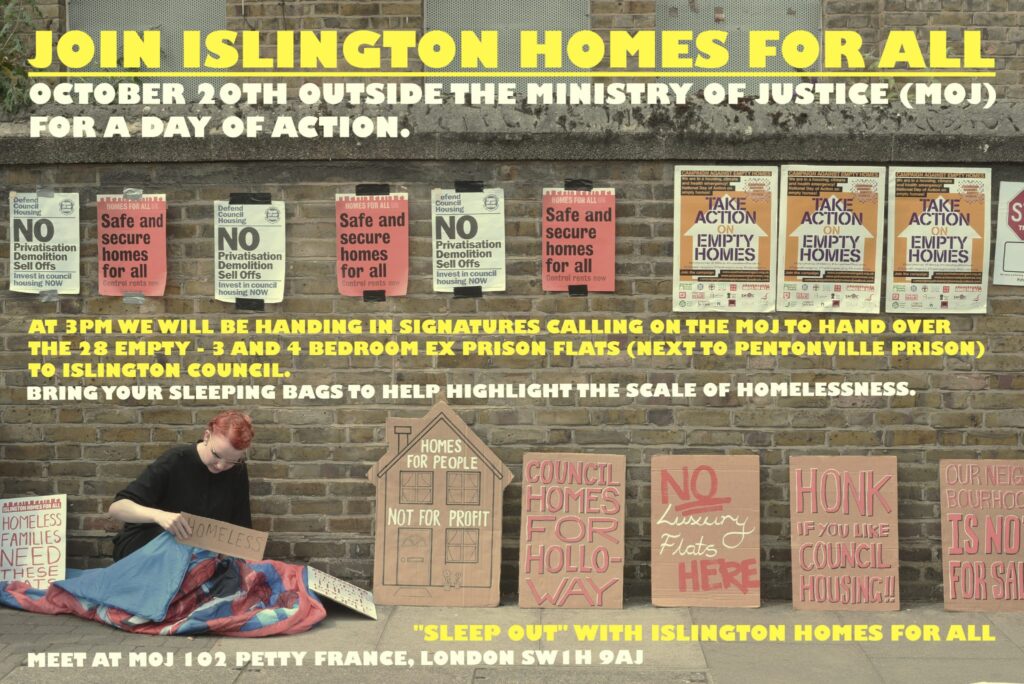
Join Islington Homes for All on Friday 20 October at 3pm outside the Ministry of Justice (MoJ) to hand in petition signatures calling on the MoJ to lease 28 empty 3 and 4-bed ex-prison flats to Islington Council for families in need – as had been originally agreed!
We will then have a sleep-out to highlight the scale of homelessness and increase in stress for people being forced to live in unaffordable, overcrowded, insecure and temporary accommodation.
Meet at MoJ, 102 Petty France, London SW1H 9AJ at 3pm, Friday 20 October
Bring your sleeping bags – and/or join later for the Sleep-Out.
Please share and sign the leaflet and petition for the 28 Empty Flats here https://forms.gle/TrRkpGY8dKr1au3E7
More about the 28 empty prison flats here


